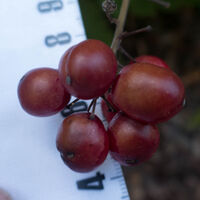red baneberry
Actaea rubra
Member of
baneberries and cohoshes (genus Actaea)
buttercup family (family Ranunculaceae)
dicots (class Magnoliopsida)
flowering plants (subphylum Angiospermae)
There are no other wild species of this genus in California.
The species has genetic variations (i.e. mutations) that produce two distinct forms, although individual plants with the same form aren’t necessarily more closely related. Note the potential confusion with the eastern species, white baneberry, which also has red-fruited and white-fruited forms.
Actaea rubra f. rubra
- has red fruit
- is the more common form in the bay area
white-fruited red baneberry
Actaea rubra f. neglecta
- has white fruit [may be lightly tinged with red]
- is the more common form in many areas, but is rare in the bay area
Edibility: “The common name makes reference to a potent poison concentrated in the fruits.” [source] “Symptoms include burning of mouth and throat, salivation, severe stomach cramps, headache, diarrhea, dizziness and hallucinations.” [source]
Toxicity of baneberry (Actaea rubra):
1 – Skin contact with these plants can cause symptoms ranging from redness, itching, and rash to painful blisters like skin burns.
4 – Ingestion of these plants, especially in large amounts, is expected to cause serious effects to the heart, liver, kidneys or brain. If ingested in any amount, call the poison center immediately.
1 observed taxon / 1 unobserved taxon / 1 key
Locations: Months: For more details, use advanced search.
Chris’s observations: 8 (all are research grade)
Taxon info: iNaturalist – Calflora – CalPhotos – Jepson eFlora – FNA
Bay Area species: iNaturalist – Calflora
